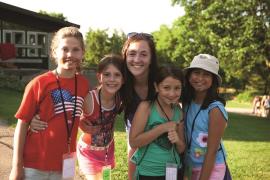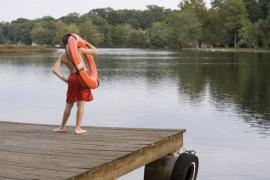Even casual observation reveals the powerful role the summer camp experience plays in accelerating character development in children and teens. The question then becomes "What's next?" The answer, it appears, is emerging leadership — often expressed through entrepreneurship.
Character Development
Character development and the moral education of children has been fodder for debate since Aristotle, peaking and waning at various junctures throughout the American experience. Regardless, it is clear that character, or a lack thereof, influences decision making and, thus, is observable in conduct. In this way, one's character differs from one's values, which are "orientations" as opposed to "activation" that connotes action, or behavior (Huitt, 2004).
Psychologist Lawrence Pervin defines moral character as "a disposition to express behavior in consistent patterns of functions across a range of situations," which implies both sustainability and predictability (Pervin, 1994).
While the development of character has historically reflected traits consistent with the industrial age, such as respect for authority and work ethic, more modern themes in character education mirror attributes found more commonly in the information age in which we live and raise our children. These include honesty, individual responsibility, justice, and dependability (Kronkosky, 2004).
Good news can be found in recent survey results reported by the Pew Research Center. In examining the differences in educational priorities between conservatives and liberals, researchers found that majorities across all groups support teaching children responsibility, independence, hard work, helpfulness, and creativity (Pew, 2014).
A review of effective and ineffective strategies in promoting character development tells us the community and the relationships that form it best aid prosocial character formation, rather than approaches that stress lecturing and moralizing (Journal of Extension, 1998).
Indeed, there are many approaches we can — and do — take in our experiential, intentional approaches to youth development that engender important character outputs. They include:
- Developing supportive adult-child relationships
- Exposing campers to community values
- Discussing expectations in different camp situations
- Considering the perspectives of others
Supportive Relationships
It may very well be the case that the first of these, supportive adult-child relationships, best sets the table for the rest. And here we can learn from psychologist Diana Baumrind's research about parenting, or "interaction," styles (Crosser, 2008).
There are essentially four styles that caregivers, including camp personnel, might adopt: indulgent, authoritarian, authoritative, and uninvolved. They differ in the extent to which they are demanding and responsive. In other words, they address what standards for behavior are established and expected (demandingness) and how warm and supportive caregivers are toward the children (responsiveness).
Each style has been linked to the amount of problematic behavior children will display as they grow and develop.
As you might guess from the label, indulgent approaches are responsive but establish few expectations for the behavior and responsibilities of the children. Indulgent adults are permissive and offer acceptance almost regardless of how their child acts. With few rules in place, these children are often prone to misbehavior.
Authoritarian patterns, on the other hand, are high on control and low on responsiveness. They tend to establish strict standards for conduct and may react harshly when those standards are not met. But they provide little supportive interaction. Children with authoritarian caregivers are often anxious, depressed, and socially unsuccessful. They also may have trouble learning to think through choices on their own, because they are used to being told what to do and what not to do with few, if any, explanations.
Authoritative styles of interaction tend to be both demanding and responsive, holding children accountable for age-appropriate behavior while engaging them in the process of understanding expectations instead of simply adopting a "my way or the highway" approach.
Finally, uninvolved approaches are neither demanding (as are authoritarian ones) nor responsive (as are indulgent ones), leaving kids feeling disconnected, unwanted, or unloved. They neither set expectations for children nor pay them much attention or offer affection and support. In a sense, they're not really acting like caregivers at all.
Clearly, authoritative approaches will be most effective in eliciting the types of behaviors we want from our campers (Wallace, 2010). According to Sandra Crosser, PhD, practical applications of this knowledge include (Crosser, 2008):
- Listening to the children
- Setting high but reasonable standards
- Explaining why you have the expectations you have
- Being willing to negotiate reasonable solutions
- Of fering choices and encouraging independence
- Valuing ideas and opinions
Navigating the World as We Know It
While the soft side of social science sometimes obscures cause and effect, it seems clear from generational change that young people are benefiting from the collective knowledge of parents, teachers, coaches, and camp professionals, despite common — and often misguided — thinking.
Against a backdrop of negativity, normal youth behavior is too often mischaracterized as dysfunctional, discordant, and marked by mood swings, acting out, and self-centeredness. Indeed, a seemingly endless trickle of news reports, studies, and anecdotal storytelling paints Generation Y — those born between 1983 and 2004 — as narcissistic, uninvolved, and lacking in empathy. Clearly, the purveyors of these observations have not spent much time at camp. Fortunately, there's a research-based view that tells another story — at least in regard to today's children and teens.
Data from the national Students Against Destructive Decisions (SADD) organization, collected in 2006 from more than 2,700 middle and high school students reveal that most young people feel good about their progress on the key developmental tasks of establishing an identity, achieving independence, and building meaningful relationships with peers. In addition, the majority of respondents reported they feel happy almost every day and perceive themselves as friendly (77 percent), honest (72 percent), and smart (72 percent) (SADD, 2006).
Tufts University Professor Richard M. Lerner also offers rebuttal to definitions of this developmental stage that routinely link it to disruptive and risky behavior. Through his research he found ample evidence among young people of what he calls the five Cs: competence, confidence, connection, character, and caring. These may coalesce, says Lerner, in a sixth C, contribution — something summer camps intentionally aim to inspire (Wallace, 2014a).
In an August 2014 New York Times article, "The Millennials Are Generation Nice," Sam Tanenhaus offers up some Cs of his own in reviewing other Pew Research Center analysis of this cohort of more than 80 million Americans. He reflects on their openness to change and propensity for communicating outward, as opposed to turning inward, through the use of social media.
Tanenhaus says, "The generation that gave us Occupy Wall Street has embraced its own modes of entrepreneurship, found across the spectrum of 'creatives,' from stylists to techies, who reject the presumed security of the corporate job and riskily pursue their own ventures." He further lauds their empathy and optimism and notes that, for many, failure has become the default outcome and ground zero of eventual triumph. Finally, he concludes the piece by offering a glimpse, perhaps, of the young people who will follow: "A new generation, as yet unnamed, is growing up in the world the millennials have made and may already be working on its own revision of the nation's moral life (Tanenhaus, 2014)."
Leadership Learned at Summer Camp
Intentional leadership development, such as the type practiced at Camp Rising Sun (CRS) in Rhinebeck, New York, has shed important new light on the outcomes of early teen summer camp experiences. In assessing the impact — across multiple domains of development — of a seven-week selective international leadership program for gifted adolescent boys and girls, CRS found that experiential learning about leadership, diversity, and sensitivity to the needs of others resulted in important personal advances in tolerance, global awareness, self-confidence, sensitivity, relationships, and development of lifelong interests (Louis August Jonas Foundation, 2014).
Similarly, campers enrolled in the teen leadership program at Cape Cod Sea Camps in Brewster, Massachusetts, routinely cite gains in maturity, leadership, personal development, social skills, adaptability, confidence, independence, and responsibility (Wallace, 2013).
Civic Engagement
There is no question that youth today are exercising leadership through civic engagement. That reveal comes in the work of young adults to improve their lives, families, schools, and communities — often through entrepreneurial behavior directed at helping others.
Research from the Center for Adolescent Research and Education (CARE), conducted by SurveyTelligence, Inc., highlights the work of young social entrepreneurs, who appear to be both people- and values-oriented, sharing with their business entrepreneur counterparts an ability to gather the resources to get things done. The findings also reveal key variables statistically tied to entrepreneurial interest and behavior, including having family responsibility in childhood (such as household chores and taking care of younger siblings) and receiving information from elders.
Not insignificantly, the traits of both social and business entrepreneurs — taken in totality — represent the type of "noncognitive" skills employers say they are looking for.
According to the Partnership for 21st Century Skills, changes are evident in how people interact with those around them: "The ways in which Americans, as citizens, engage in their communities, their country, and the world are changing and expanding. The challenges of being a responsible, effective citizen are more diverse, nuanced, and complex than in the past. Sustaining our democracy, strengthening economic competitiveness and meeting local, state, national, and global challenges demands a broader vision of citizenship (Partnership, 2014)."
Which brings us back to our young social entrepreneurs.
Common characteristics of those creating positive change also include sociability, adaptability, motivation, and optimism. That final trait — optimism — and positive thinking are predictive of better health outcomes, including those related to length of lifespan, rates of depression, and coping skills during times of hardship and stress (Mayo Clinic, 2014).
By temperament and training, young people are poised to move beyond doing good to doing well, perhaps becoming a Richard Branson, Bill Gates, or Mark Zuckerberg of tomorrow (Wallace, 2014b).
It is important to point out that while youth interested in social entrepreneurship possessed many of the same background traits and experiences as those pursuing economic ends, community service-minded individuals were more likely to express commitment to faith and values, report interaction with positive peers, and have greater motivation to develop healthy social connections with others. Additional factors, such as increased exposure to grandparents, foreign travel, and attending summer camp, also influence entrepreneurial activity regardless of whether that fulfills business- or community-based goals.
Entrepreneurship and the Connection to Summer Camp
Study participants who attended a summer camp were significantly more likely to state an interest in social entrepreneurship than those who had not attended. Why? They cited the inf luence of counselors, especially in mentoring them to develop social and leadership skills; assisting them in obtaining social and material resources to start new projects; and guiding them in understanding such projects and identifying other mentors. Young people who had started their own businesses or were highly interested in doing so were especially influenced by camp counselors who taught them how to gather resources needed to achieve goals.
Peg Smith, retiring CEO of the American Camp Association and a CARE Advisory Board member, explains, "Camps are rich in mentors, providing children and teens with nurturing adults who help them to learn more about themselves and cultivate individual interests and talents. When those relationships motivate service, it's truly a win-win situation."
This data supports earlier research from SADD, a CARE collaborator, which revealed that teens with mentors reported they are significantly more likely than those without mentors to challenge themselves by taking positive risks, such as volunteering to perform community service. That study also noted young people who participated in camp were significantly more likely to report being highly mentored, taking positive risks, and possessing a healthier sense of self (SADD, 2006).
Jennifer Hall, PhD, at the Leadership Development Institute at Eckerd College and co-author of the Entrepreneurial Dimensions Profile (EDP), an assessment tool based on research into the traits, motivations, and skills of entrepreneurs, agrees with the notion that an "entrepreneurial mindset" can be developed at camp. "The results of this research are noteworthy for camps and their counselors," says Hall, listing additional traits of entrepreneurs measured by the EDP, such as persistence, future focus, and idea generation, which she says young people can use to help shape the social and economic landscape worldwide.
Regardless of who's doing the teaching, young people benefit from:
- Having assigned responsibilities
- Engaging in dialogue about values and faith
- Hearing about successful social entrepreneurs
- Developing close relationships with the adults in their lives
- Receiving encouragement about their ability to succeed
At home, at camp, at school, and beyond, influential mentors motivate young people to be a force for positive change, here and around the world — truly an important consequence of character (Wallace, 2014c).
References
Crosser, S. (2008). Helping young children to develop. Early Childhood News. Retrieved from www.earlychildhoodnews.com/earlychildhood/article_view.aspx?ArticleID=2…
Huitt, W. (2004). Moral and character development. Educational Psychology Interactive. Valdosta, GA: Valdosta State University. Retrieved from www.edpsycinteractive.org/ morchr/morchr.html
Journal of Extension. (1998). Character education: developing effective programs. Retrieved from www.joe.org/joe/1998april/a3.php
Kronkosky Charitable Foundation. (2004). Character development in youth. Retrieved from www.kronkosky.org/research/ Research_Briefs/Character%20Development%20 of%20Youth%20Jan%202004.pdf
Louis August Jonas Foundation. (2014). Retrieved from www.lajf.org
Mayo Clinic. 2014. Positive thinking: Stop negative self-talk to reduce stress. Retrieved from www.mayoclinic.org/healthy-living/ stress-management/in-depth/positivethinking/ art-20043950
Partnership for 21st Century Skills. (2014). A vision for 21st century citizenship. Retrieved from www.p21.org/our-work/citizenship
Pervin, L. (1994). A critical analysis of current trait theory. Psychological Inquiry. Retrieved from www.tandfonline.com/action/ doSearch?quickLinkJournal=&journalText= &AllField=Pervin&publication=40000733
Pew Research Center for People & the Press. (2014). Teaching the children: sharp ideological differences, some common ground. Retrieved from www.people-press.org/2014/09/18/teachingthe- children-sharp-ideological-differencessome- common-ground/
Tanenhaus, S. (2014). The millennials are generation nice. New York Times. August 15, 2014. Retrieved from www.nytimes.com/2014/08/17/fashion/the-millennials-are-generation-nice…
SADD (Students Against Destructive Decisions). (2006). New study shows teens with "natural" mentors have higher sense of self and take more positive risks. Teens Today. December 13, 2006. Retrieved from www.sadd.org/ teenstoday/mentors.htm
Wallace, S. (2010). Confessions of a disciplinarian: how managing camper behavior can save the summer. Camping Magazine. Retrieved from www.ACAcamps.org/ campmag/1005/confessions-disciplinarian
Wallace, S. (2013). Change agents: social entrepreneurship and the summer camp experience. Camping Magazine. Retrieved from www.ACAcamps.org/ campmag/1305/change-agents
Wallace, S. (2014a). Oddly hopeful: a counterintuitive view of modern-day adolescence. Independent School. National Association of Independent Schools. Retrieved from www.nais.org/ Magazines-Newsletters/ISMagazine/Pages/ Oddly-Hopeful.aspx
Wallace, S. (2014b). Good will hunting: families key to promoting youth entrepreneurship. Psychology Today. June 2, 2014. Retrieved from www.psychologytoday.com/blog/ decisions-teens-make/201406/good-will-hunting Wallace, S. (2014c). A consequence of character. The Huffington Post. April 24, 2014. Retrieved from www.huffingtonpost.com/ stephen-gray-wallace/a-consequence-ofcharacte_ b_5168036.html
Leann Mischel, PhD, senior research fellow at the Center for Adolescent Research and Education (CARE), is an associate professor at Susquehanna University, where she has started an entrepreneurship program. Dr. Mischel has published in leading journals in her field, spoken at conferences around the globe, and been recognized in Entrepreneurship Magazine, The New York Times and USA Today.
Stephen Gray Wallace, MS Ed, has broad experience as a school psychologist and adolescent counselor. He serves as director of counseling and counselor training at the Cape Cod Sea Camps; senior advisor for SADD; director of the Center for Adolescent Research and Education (CARE); and parenting expert at kidsinthehouse.com and NBCUniversal's parenttoolkit.com. For more information about Stephen's work, visit www.stephengraywallace.com.
© Summit Communications Management Corporation 2015. All Rights Reserved
Photo courtesy of Camp Akita, Logan, Ohio.
Originally published in the 2015 January/February Camping Magazine.



